Published Apr 26, 2022
Wesley Crusher, Nog, and the College Students of Tomorrow
Wesley and Nog's experiences at Starfleet Academy highlight their different backgrounds and privileges
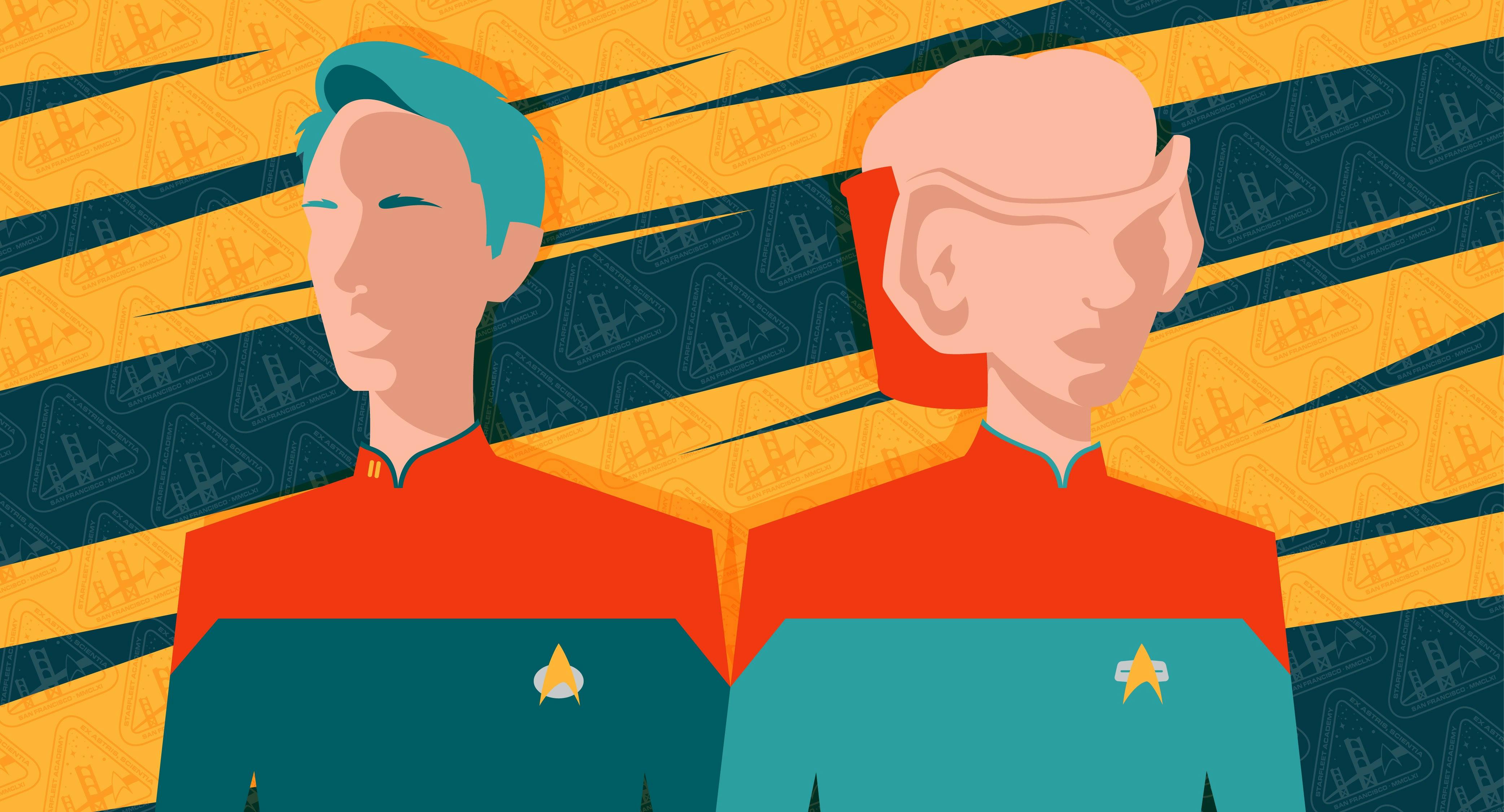
StarTrek.com
Star Trek is regarded as one of the most influential works of science fiction in history and a major source of trailblazing futuristic and innovative thinking, both technological and otherwise. One of the areas where the utopian vision of Star Trek has not historically met its idyllic aspirations, however, is in regards to education. In particular, higher education in the universe of Star Trek faces many of the same – or highly similar – challenges as what the institution sees today. This is perhaps no clearer than in the depictions of how two characters – The Next Generation’s Wesley Crusher and Deep Space Nine’s Nog – navigate their ways into and through Starfleet Academy over the course of their narrative journeys.
Wesley Crusher and Nog
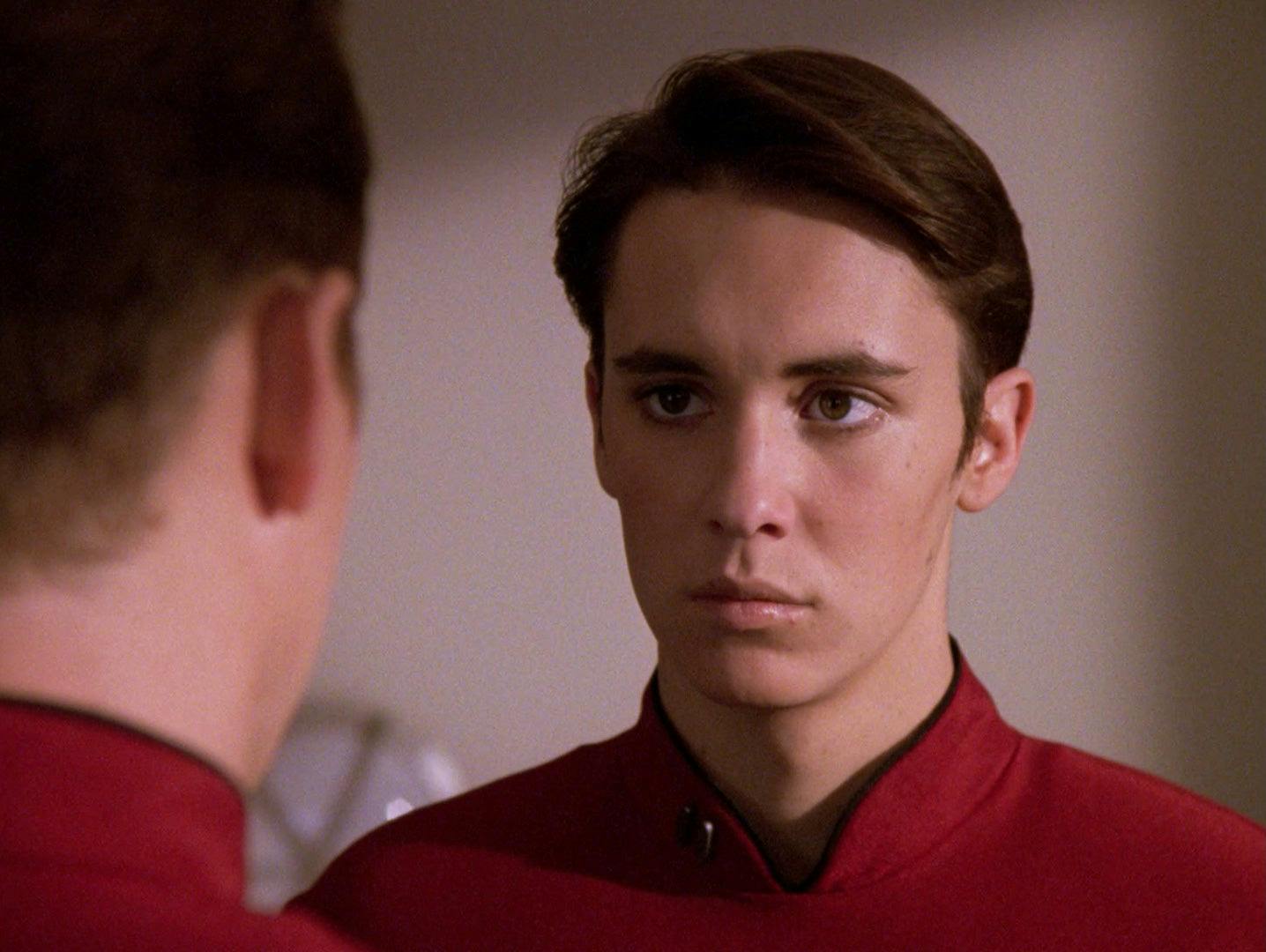
StarTrek.com
Wesley Crusher is introduced in the first episode of Star Trek: The Next Generation as the young son of two Starfleet officers: Chief Medical Officer Beverly Crusher and the deceased Lieutenant Jack Crusher. During his time living on board the Starfleet flagship Enterprise with his mother, he is shown to be highly intelligent, ambitious, and curious, and attempts to enter the prestigious Starfleet Academy as soon as he reaches the minimum age of admittance. Even prior to his initial attempt to enter Starfleet Academy, he impresses Captain Jean-Luc Picard enough with his skills to earn an appointment as Acting Ensign on the Enterprise, and is even permitted to act as a helmsman on the bridge. During his initial Starfleet Academy entrance examination, he utilizes his privileged experiences on the Enterprise to pass a surreptitious diplomatic test, in which he was required to recognize a subtle alien characteristic in an adversary, and then utilize one of that species’ social norms to disarm a conflict. While Wesley does not earn admittance to the Academy on this first attempt, the testing process revealed the advantages of both his privileged position on the Enterprise and his status as a continuing-generation college student: a college student whose parents both attended higher education.
Once Wesley does eventually earn his way into Starfleet Academy, his experiences continue to pay off, as he is offered a special position among an ace group of cadet pilots – Nova Squadron – explicitly due to his experiences on the Enterprise. While this association ultimately leads Crusher into major disciplinary trouble following his participation in the coverup of a fatal Nova Squadron training accident, he ultimately evades expulsion from Starfleet Academy. Though Wesley ultimately takes an extended leave of absence from the Academy, he eventually returns to complete his studies, and eventually earns the rank of Lieutenant Junior Grade in Starfleet.
In stark contrast to the privileged higher education journey of Wesley Crusher is that of Nog, the young Ferengi ne’er-do-well of Deep Space Nine. Unlike Wesley Crusher, who is a human with close family connections to Starfleet Academy, Nog is a complete outsider to higher education. As a Ferengi – a race outside of the United Federation of Planets – he is raised from vastly different cultural norms from humans. For instance, Ferengi do not engage in formal higher education. Instead, part of their coming-of-age ritual is the selection of a mentor, whom they pay a ceremonial fee to apprentice under in order to enter a profession . Nog, as a resident of Federation-operated starbase Deep Space Nine, is exposed to members of Starfleet, and is impressed by their trained skills in engineering. Ferengi are culturally pressured into the field of business and are thus not offered clear pathways to pursue scientific fields like engineering. Nog and his father – Rom – are both more naturally inclined to engineering, to the disappointment of their Ferengi family. Nog sees becoming a Starfleet officer as his best opportunity to avoid becoming an unsuccessful businessman like his father. However, Nog is unfamiliar with the customs and norms surrounding Starfleet and the Federation, and has to be informed that entrance into Starfleet isn’t done through apprenticing. As a member of a non-Federation race, Nog is forbidden from entering Starfleet Academy without a letter of recommendation from a Command-level Starfleet officer. To make things more difficult, Nog also has to struggle with his own family due to his Starfleet ambitions, including overcoming an overt attempt to sabotage his Academy entrance exam by his uncle Quark.
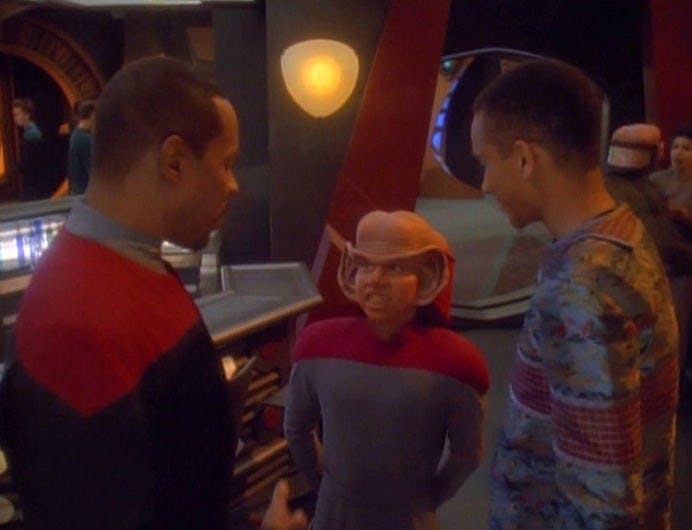
StarTrek.com
Nog’s journey to Starfleet Academy includes jumping through additional proverbial hoops as well. He is forced to participate in a preparation program before qualifying to become a cadet at Starfleet Academy, another step that Wesley Crusher was never subjected to. This process further exposes both his and his family’s inexperience with Federation customs, as his father has a Starfleet Academy cadet uniform made for Nog before his is officially admitted – apparently a violation of custom and decorum for the Academy. His struggles continue once he attends the Academy, as he generally fails to socially connect with his peer cadets. While Nog works his way through the Academy and into an officer position in Starfleet, it is evident that he has a highly different experience of the process than Wesley Crusher. Several factors contribute to why the higher education experiences of these two characters are so different, including their family relationships to the Academy, their nationalities, and their different racial backgrounds.
First-Generation v. ‘Next Generation’
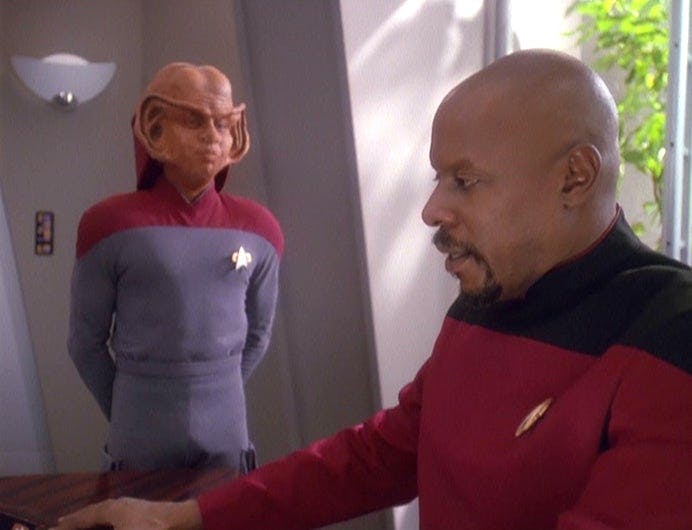
StarTrek.com
Nog fits the definition of a first-generation college student, a term used to describe people who are the first in their family to attend higher education. First-generation college students frequently struggle with what is called ‘the hidden curriculum’ – the unspoken set of norms, practices, and rules that govern an education institution. Continuing generation students typically have some familiarity with higher education through their parents – and are often already familiar with the intricacies of the hidden curriculum because of their proximity to the institution. Wesley Crusher, for instance, was raised by two parents who both attended Starfleet Academy, and was intimately familiar with the institution, its processes, and its customs from a young age. Unlike Nog, Crusher never struggles to understand the admissions requirements to enter Starfleet Academy. As mentioned previously, Crusher’s privileged experiences and position aided him in his journey into and through Starfleet Academy in both his curricular and extracurricular pursuits. Nog has an inverse experience – his lack of familiarity with the norms of the Federation affects his ability to socially acclimate to Starfleet Academy, and his lack of privileged experiences prevent him from receiving coveted appointments to exclusive clubs like Nova Squadron or Red Squad. However, the issues that Nog faces go beyond merely being a first-generation college student. Nog is also technically an international student – a group that is often subject to social isolation within higher education today, and who struggle to acclimate to their local communities. Even more prominently, Nog is also a racial outsider to Starfleet Academy, which comes with its own deep set of challenges.
Exclusion in Utopia
Nog is shown to be the first Ferengi to ever attend Starfleet Academy. As is seen over the course of Deep Space Nine, the process of his admission differs from that of Wesley Crusher due to his racial outsider status. Most notably, Nog is required to have a letter of recommendation from a Command-level Starfleet officer in order to be considered for admission into the Academy. For obvious reasons, it would be rare for a child from a non-Federation planet or race to be intimately familiar enough with a Starfleet commander to earn a letter of recommendation. As Commander Sisko notes in a conversation with Nog, writing such a recommendation for an outsider to attend the Academy “puts [their] reputation on the line,” indicating that this is a rare concession for a Command-level officer to make. Nog ultimately has to emotionally divulge an immense amount of sensitive personal information to convince Commander Sisko to take a chance on recommending him to the Academy, a vulnerable process that Wesley Crusher certainly never had to go through. The higher admission standards to Starfleet Academy for members of outsider groups mirrors exclusionary practices from reality, which have been used to keep members of marginalized groups outside of specific higher education institutions. Nog is not the only character in Star Trek to be the first member of their race to attend Starfleet Academy.
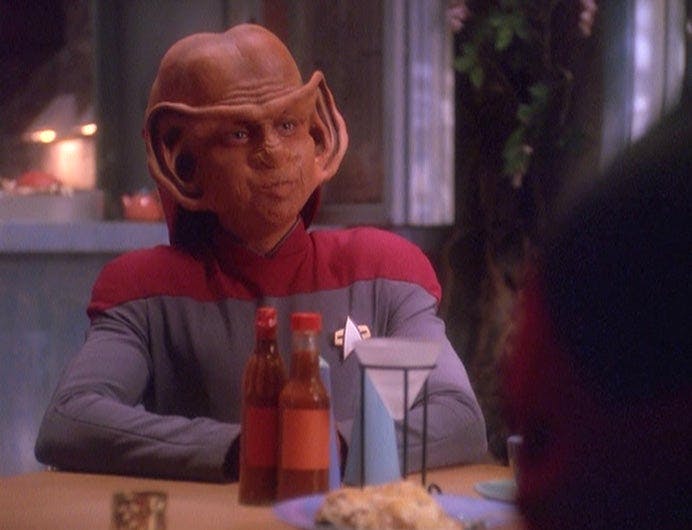
StarTrek.com
Worf, a central character on both Star Trek: The Next Generation and Star Trek: Deep Space Nine, is the first member of the Klingon race to attend Starfleet Academy. Mardock, who competes with Wesley Crusher in his initial attempt to enter the Academy, is the first Benzite to earn admission. However, the character who best exemplifies the racial challenges of Federation education is Voyager’s B’Elanna Torres. Torres – a multiracial Klingon-human – is subject to racial bullying and disparate treatment from both peers and authority figures throughout her education experience, which includes Starfleet Academy. Her experience aligns with an unfortunate reality – Black and multiracial students are disciplined at far higher rates than their peers within the American education system today, and are more frequently targets of bullying. Torres ultimately drops out of Starfleet Academy due to her constant conflicts with peers and professors. Torres seems to experience a documented effect called racial battle fatigue: social-psychological stress responses that result from repeated treatment as a racial outsider in an institution, which includes experiencing repeated microaggressions and ultimately becoming resistant or withdrawn. Nog, unlike Torres, persists to graduate from the Academy, and successfully serves as a Starfleet officer. However, Nog also exhibits signs of racial battle fatigue, particularly in regards to his isolated social experience in Starfleet Academy. It is also worth noting that, had Nog been embroiled in a similar incident as Wesley Crusher with Nova Squadron, it is more likely that he would have been expelled.
As mentioned previously, Crusher evades expulsion for his part in the Nova Squadron cover-up. However, there is aforementioned research that indicates that members of marginalized racial groups are disciplined more harshly than white students in our education system today. Based on B’Elanna Torres’s experiences and the explicitly inequitable admission processes for racial outsiders to Starfleet Academy, Star Trek’s education system is clearly not beyond racial power dynamics, so it is not unreasonable to expect different disciplinary treatments for students based on their race.
The narratives of Wesley Crusher and Nog both echo challenges and experiences of today’s college students, with a slight twist to a futuristic science-fiction setting. However, Star Trek - and science fiction in general - are valuable as venues of speculation about where we could be going. What new challenges await us? So far, the franchise hasn’t showcased much innovation in what higher education or the college student experience could look like in a vastly different world: one with a legacy of utopian imagination. However, there is an optimistic element of the journeys of Nog and Wesley Crusher - they are both last seen in the franchise as holding the equivalent rank of Lieutenant Junior Grade.
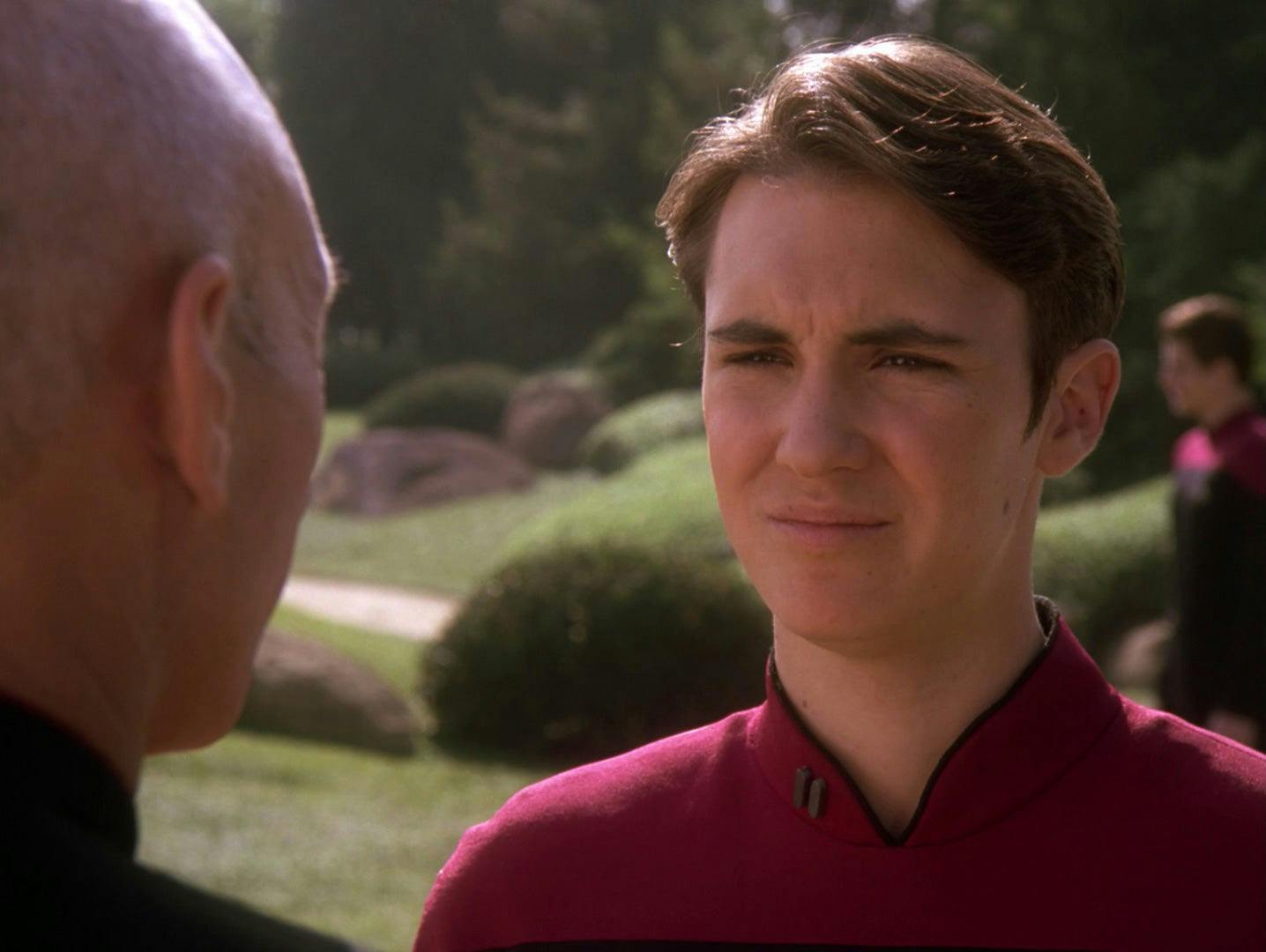
StarTrek.com
All of this said, the Star Trek franchise seems poised to dive into the world of higher education head first in the coming years. The latest season of Picard offers at least a glimpse of a Starfleet Academy under Admiral Jean-Luc Picard’s administration, with the institution reconsidering elements of its curriculum and admitting its first fully-Romulan cadet in Elnor. Discovery recently saw Lieutenant Tilly depart the eponymous vessel to take a position at the recently reopened Starfleet Academy of the even more distant future. I have my fingers crossed that we’ll see more than remixed echoes of today’s education issues on display in these new forays into the future of learning.
Gordon Maples (he/him) is a PhD student in Higher Education Opportunity, Equity, and Justice at North Carolina State University’s College of Education. He is a published scholar and researcher in the field of higher education, an IMDb-recognized external critic, and has written and presented at conferences about popular culture and higher education (including two appearances at Con of Thrones and an ongoing written series on portrayals of higher education in film). He writes film reviews at Misan{trope}y Movie Blog.
